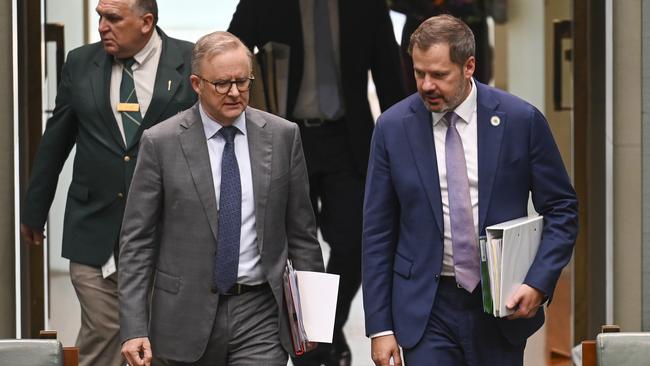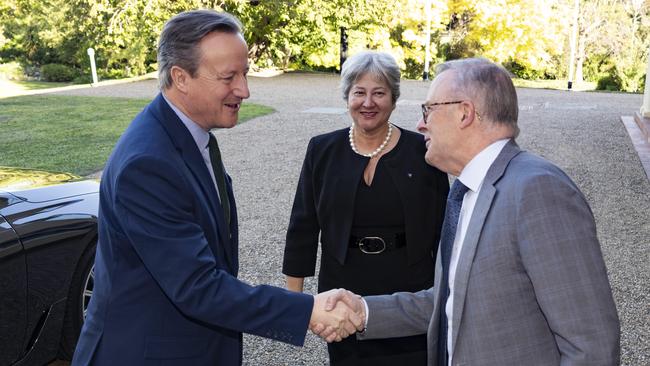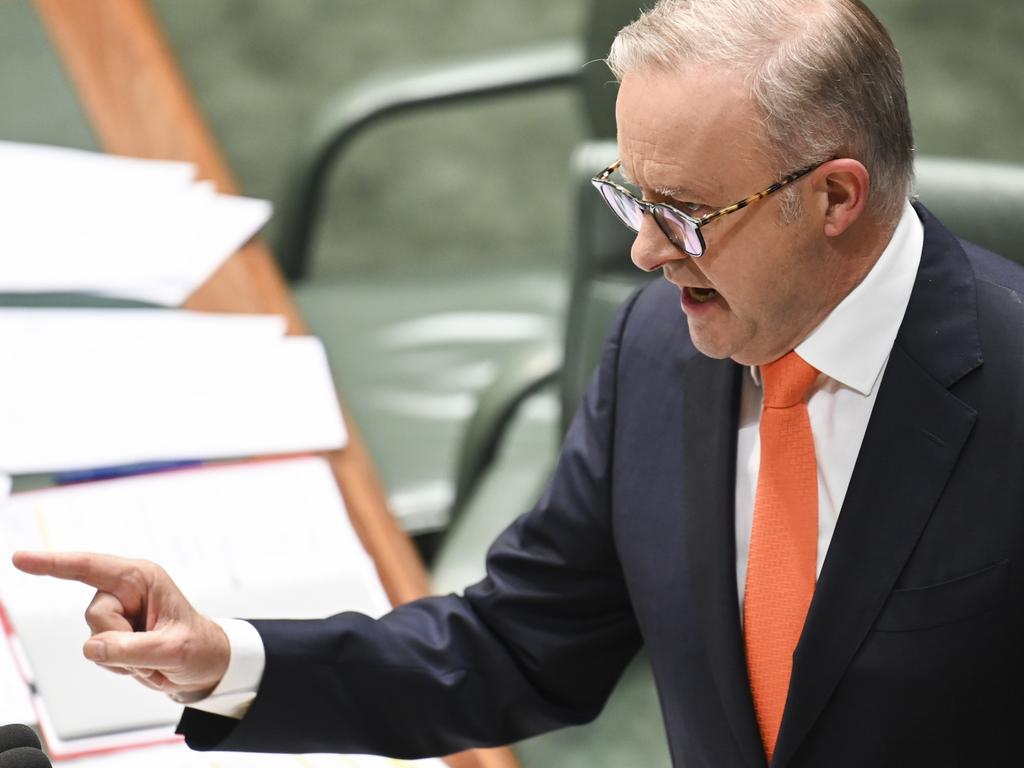At a time of rising tensions, strong political leadership has gone missing
In the face of growing resentment about offshore wind turbines, solar farms and thousands of kilometres of new wires, as well as rising energy bills, Chris Bowen derides the Coalition’s sketchy nuclear policy and refuses to entertain a debate.

Where has the ability – and the preparedness – to persuade the public of the need for a measure that involves financial pain gone?
At a crucial time of global strategic tensions and souring economic outlook there is great need for plain political speaking and strong leadership willing to break out of cautious guardrails of offence and sectional interests.
In recent months, when the public has needed leadership, there has been an absence of candid talk. Instead there has been blame-shifting, cowardice in the face of bullying and threats, a failure to take responsibility, a paucity of well-prepared and argued policy, and a retreat into the politics of the least offence, the least resistance and the most popular. Slogans and slurs are used instead of argument and appeal to fears not far below the surface.
There have been growing social divisions and anti-Semitism since the Hamas atrocities in October last year amid a want of early direct leadership, and public anxiety is rising about crime when there is a legal debacle about 149 convicted criminals released from immigration detention.
China is sowing division within Australia and between allies as it claims lifting barriers and tariffs on barley, wine and lobster is a quid pro quo for renewed access for Chinese wind turbines and guaranteed security for the lease on the Port of Darwin, which Foreign Minister Penny Wong denies.
Peter Dutton seeks to prosecute the ill feeling about record immigration and a deepening housing crisis while Anthony Albanese argues the migration intake would have been much greater under a Coalition government and promises to build more houses.
After the failure last year of the referendum on the Indigenous voice to parliament, Labor dropped references to the rest of the Uluru agenda, the Prime Minister pushed the failure of the vote on to Indigenous campaigners and he made billion-dollar spending announcements in the Northern Territory.
In the face of growing resentment about offshore wind turbines, solar farms and thousands of kilometres of new wires, as well as rising energy bills, Climate Change and Energy Minister Chris Bowen derides the Coalition’s sketchy nuclear policy and refuses to entertain a debate.
Even the good economic news this week of unemployment falling to 3.7 per cent for February and Jim Chalmers’ buoyant outlook and prospect of another budget surplus in May is tempered by his more muted warnings about global downturns and recessions in Britain, Japan and now New Zealand.
In a considered second maiden speech in the Senate, if it’s possible to give a second maiden speech, former Liberal MP for Wentworth in Sydney Dave Sharma, with the extra freedom of such an occasion, unveiled the frustration of those in Canberra who can see the shortcomings of the daily attempts to escape responsibility and seek the political refuge of the popular.
Sharma, a former Australian ambassador, could well have been putting forward a bit of a job application, but as a freshly minted senator he spoke with a clarity and truth – a non-partisan truth – that weak leadership, complacency and a lack of awareness of the bigger picture can destroy the great advantages Australia has.
“We have forged a nation out of the most diverse group of people imaginable into one that is prosperous, secure, united and harmonious,” he said after declaring he was not ashamed to say he was a patriot. “The opportunities we provide our citizens are without parallel. Our freedoms are robust. Our institutions are strong. Our quality of life is the envy of the world. We should never, however, make the mistake of assuming that Australia’s success is preordained, a birthright of our nation.
“Representing Australia as a diplomat overseas, I have seen how countries can quickly run aground: by neglecting their fundamentals, by magnifying small differences, by indulging special interests, by allowing hubris to take hold.”
Sharma then listed the errors of complacency: “The biggest challenge we face in Australia is that born out of complacency. It’s complacent to assume we can focus on the small issues because the big issues look after themselves. It is complacent to assume that future prosperity is assured because the past has been kind.”
He went on: “It is complacent to assume that our security is safeguarded by powerful allies and remoteness. The truth is Australia faces challenges the likes of which we have not encountered for many decades.”

As a former ambassador to Israel and MP in Sydney’s eastern suburbs, Sharma concentrated on the social threat from anti-Semitism.
“But too frequently of late, our leaders have muted their voices, and our institutions have neglected their duties in maintaining this compact,” he said. “Discrimination, vilification, harassment and intimidation against the Jewish community in Australia has reached unprecedented levels.”
This week also was marked by the sudden threat of division over moves to change laws protecting religious schools from discrimination cases for hiring teachers and staff who share the same religion or at least the same ethos as the school. Scott Morrison tried and failed to introduce reforms to protect schools, staff and students but was forced into retreat and Albanese grabbed the opportunity before the 2022 election to promise religious groups there would be new laws under a Labor government preserving their integrity.
Albanese is facing a pincer between faith-based schools that teach hundreds of thousands of students who want to keep their right to choose teachers based on beliefs and the LGBTIQ sector that demands greater rights to challenge schools on hiring.
Like the voice referendum and the competing sides in the Israel-Hamas conflict, the religious freedom bills have the potential to spark division and social discord.
Albanese, seeing the potential for division and having learned from the failure of the voice referendum in a policy and political sense, sought bipartisanship on the religious bills and vowed not to bring them forward unless there was such bipartisanship.
This could be the moment of an enlightening experience in a significant political and policy area but, given the clear intent of Labor to blame the Opposition Leader for the failure of the bills, which was the plan for the Indigenous voice, this is hardly a policy cleanskin.
Even as the parliament rose on Thursday Attorney-General Mark Dreyfus, in keeping with Albanese’s earlier moves to distance the government from the explosive report that recommends changes unacceptable to both faith-based groups and the opposition, said it was not a report “of the government”, it was a report “to the government”, which the government would consider.
Yet this report was founded on the government’s own terms of reference and had delivered exactly what the government wanted. Even the Australian Law Reform Commission repeatedly said it had delivered what was dictated by the terms of reference and if the recommendations were not implemented the government’s own requirements would not be met.
Earlier in the week Home Affairs Minister Clare O’Neil, who previously has blamed the High Court and Dutton for the debacle that is the handling of immigration detainee criminals after they were released by the High Court, shifted responsibility for the decision to remove security controls on a rapist to the Community Protection Board. That’s the board O’Neil appointed and that she can overrule.
Industry Minister Ed Husic, who signed off on the lifting of anti-dumping action against Chinese wind turbine importers, which Beijing said was a “good gesture” and would help the lifting of tariffs on Australian wine and lobster, also indicated it was a commission taking the decisions. Husic certainly didn’t want to be seen to be dudding local steel manufacturers or to be pandering to China, but it was obviously a decision that Foreign Affairs and Trade wanted public before the arrival of Chinese Foreign Minister Wang Yi.
For Dutton’s part, he has embarked on a difficult task in trying to sell nuclear energy for Australia but this is one of those massive persuasive tasks that is going to require more than goodwill from Coalition supporters.
This is no time for weak leadership, blame shifting, lack of responsibility or want of hard work.
Learn from Sharma’s overseas experience: we can founder if there is complacency, inertia and a loss of values.








When is somebody in political leadership – anybody will do – going to stand up and take responsibility for an error of judgment or a mistake and promise to do their best to fix it? When is somebody not going to deflect blame on to a faceless committee of public servants? When is someone going to embark on a policy campaign that is unpopular, necessary and needs hard work to sell?